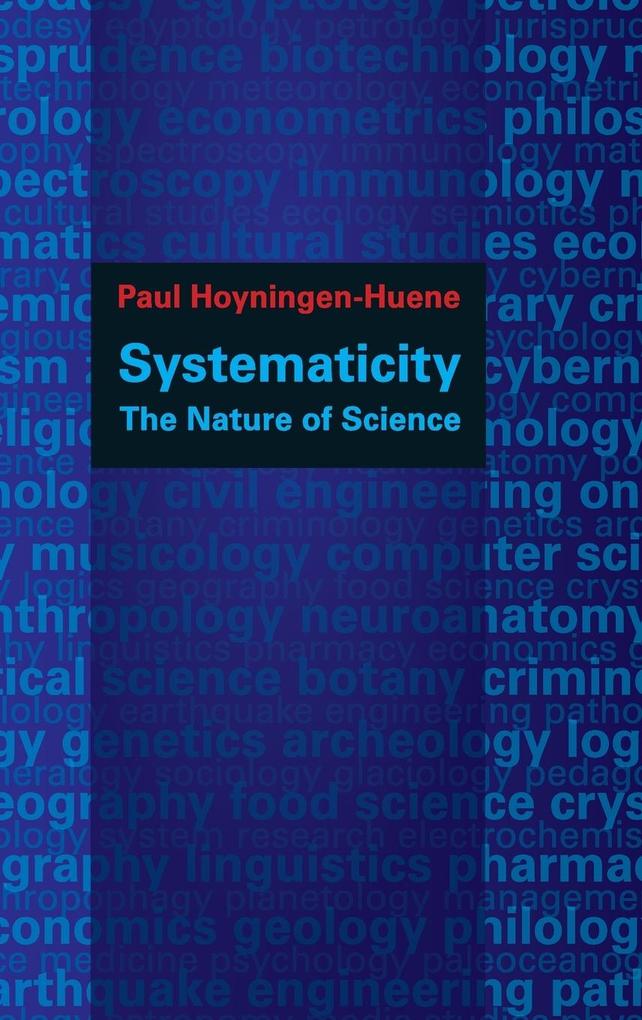
Zustellung: Do, 26.06. - Di, 01.07.
Versand in 2 Wochen
VersandkostenfreiBestellen & in Filiale abholen:
In Systematicity, Paul Hoyningen-Huene answers the question What is science? by proposing that scientific knowledge is primarily distinguished from other forms of knowledge, especially from everyday knowledge, by being more systematic.
Inhaltsverzeichnis
- Preface
- 1 Introduction
- 1.1 Historical Remarks
- 1.2 The Question "What Is Science?" in Focus
- 2 The Main Thesis
- 2.1 Science and Systematicity
- A) A Little History
- B) Preliminary Remarks
- 2.2 The Concept of Systematicity
- 2.3 The Structure of the Argument
- 3 The Systematicity of Science Unfolded
- 3.1 Descriptions
- A) Some Preliminaries
- B) Axiomatization
- C) Classification, Taxonomy, and Nomenclature
- D) Periodization
- E) Quantification
- F) Empirical Generalizations
- G) Historical Descriptions
- 3.2 Explanations
- A) Some Preliminaries
- B) Explanations Using Empirical Generalizations
- C) Explanations Using Theories
- D) Explanations of Human Actions
- E) Reductive Explanations
- F) Historical Explanations
- G) Explanation and Understanding in the Humanities in General
- H) Explanations in the Study of Literature
- 3.3 Predictions
- A) Some Preliminaries
- B) Predictions Based on Empirical Regularities of the Data in Question
- C) Predictions Based on Correlations with Other Data Sets
- D) Predictions Based on (Fundamental) Theories or Laws
- E) Predictions Based on Models
- F) Predictions Based on Delphi Methods
- 3.4 The Defense of Knowledge Claims
- A) Some Preliminaries
- B) Non-Evidential Considerations
- C) Empirical Generalizations, Models, and Theories
- D) Causal Influence
- E) The Verum Factum Principle
- F) The Role of Mathematics in the Sciences
- G) Historical Sciences
- 3.5 Critical Discourse
- A) Some Preliminaries
- B) Norms and Institutions
- C) Practices in Science Fostering Critical Discourse
- 3.6. Epistemic Connectedness
- A) Preliminaries: The Problem
- B) Failing Answers
- C) The Concept of Epistemic Connectedness
- D) Revisiting the Examples
- 3.7 The Ideal of Completeness
- A) Some Preliminaries
- B) Examples
- 3.8 The Generation of New Knowledge
- A) Some Preliminaries
- B) Data Collection
- C) The Exploitation of Knowledge from Other Domains
- D) The Generation of New Knowledge as an Autocatalytic Process
- 3.9 The Representation of Knowledge
- A) Some Preliminaries
- B) Examples
- 4 Comparison with Other Positions
- 4.1 Aristotle
- A) The Position
- B) Comparison with Systematicity Theory
- 4.2 René Descartes
- A) The Position
- B) Comparison with Systematicity Theory
- 4.3 Immanuel Kant
- A) The Position
- B) Comparison with Systematicity Theory
- 4.4 Logical Empiricism
- A) The Position
- B) Comparison with Systematicity Theory
- 4.5 Karl R. Popper
- A) The Position
- B) Comparison with Systematicity Theory
- 4.6 Thomas S. Kuhn
- A) The Position
- B) Comparison with Systematicity Theory
- 4.7 Paul K. Feyerabend
- A) The Position
- B) Comparison with Systematicity Theory
- 4.8 Nicholas Rescher
- A) The Position
- B) Comparison with Systematicity Theory
- 5 Consequences for Scientific Knowledge
- 5.1 The Genesis and Dynamics of Science
- A) Conceptual Clarifications
- B) The Genesis of a Science
- C) The Dynamics of Science
- 5.2 Science and Common Sense
- A) The Preservation of Common Sense
- B) The Deviations from Common Sense
- C) Additional Remarks
- 5.3 Normative Consequences
- 5.4 Demarcation from Pseudo-Science
- A) A Little History
- B) Systematicity Theory's Demarcation Criterion
- 6 Conclusion
- Notes
- Literature
- Literature
Produktdetails
Erscheinungsdatum
26. April 2013
Sprache
englisch
Seitenanzahl
304
Autor/Autorin
Paul Hoyningen-Huene
Verlag/Hersteller
Produktart
gebunden
Gewicht
530 g
Größe (L/B/H)
244/159/30 mm
ISBN
9780199985050
Entdecken Sie mehr
Bewertungen
0 Bewertungen
Es wurden noch keine Bewertungen abgegeben. Schreiben Sie die erste Bewertung zu "Systematicity" und helfen Sie damit anderen bei der Kaufentscheidung.









